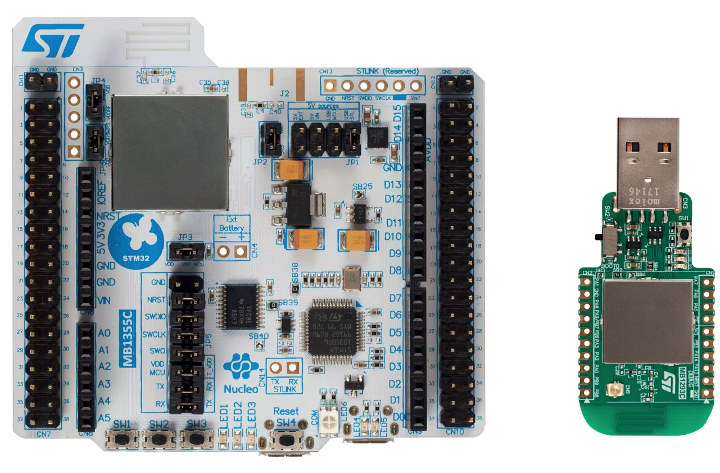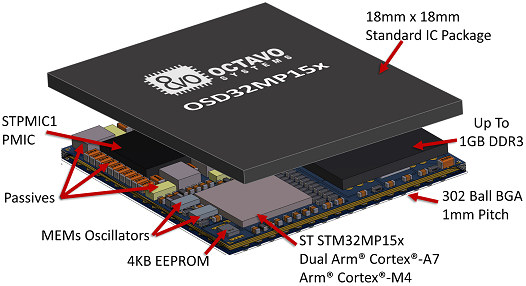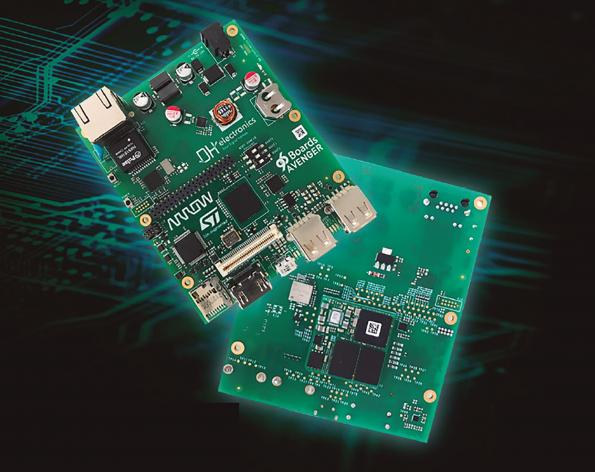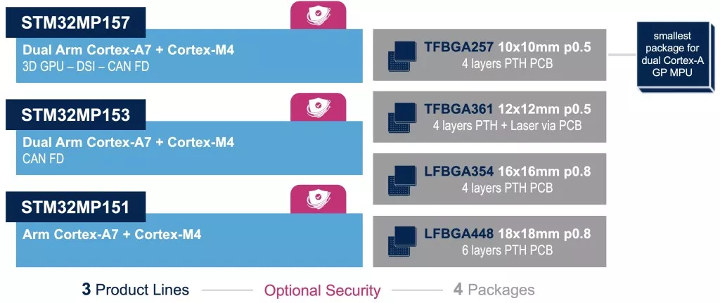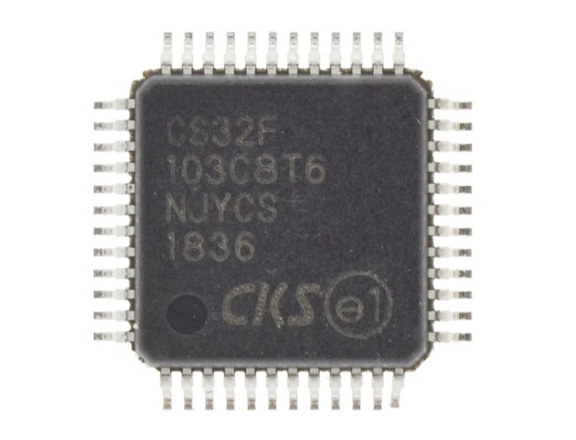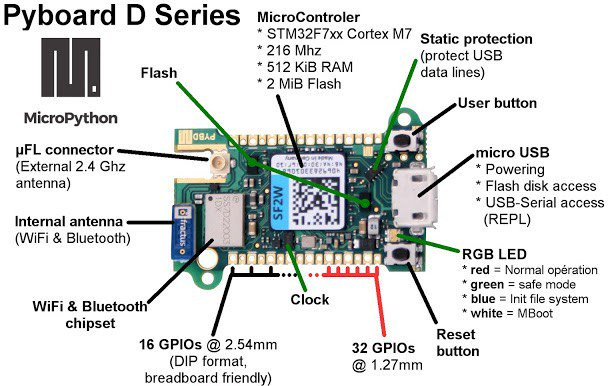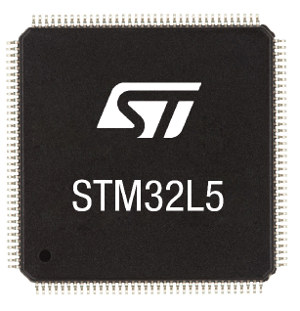STMicro unveiled their first STM32 Wireless MCU family at Embedded World 2018 last year with STM32WB dual-core Cortex-M4/M0+ microcontroller equipped with Bluetooth 5 and 802.15.4 radios, but it was only this year at Embedded World 2019 that the company announced commercial availability of STM32WB55 family as well as the P-NUCLEO-WB55 development pack containing a classical Nucleo 64 board and a USB dongle. STMicro STM32WB55 Bluetooth 5 & 802.15.4 MCU Key features and specifications: Application Core – Arm Cortex-M4 CPU @ up to 64 MHz with FPU, adaptive real-time accelerator (ART Accelerator), MPU, 80 DMIPS and DSP instructions Memory – Up to 256 KB RAM, including 64 KB with hardware parity check, 20×32-bit Backup Register Storage Up to 1 MB Flash with sector protection (PCROP) against R/W operations for Bluetooth Low Energy and 802.15.4 SW stack Quad SPI memory interface with XIP Radio 2.4 GHz RF transceiver supporting Bluetooth 5 and […]
Octavo Systems Unveils OSD32MP15x STM32MP1 SiP (System-in-Package)
STMicro STM32MP1 is one of the most interesting microprocessor recently announced, as it should allow a relatively easy upgrade path for projects based on the traditional STM32 Cortex-M4 microcontrollers, thanks to backward compatibility, and the extra one or two Arm Cortex-A7 cores enabling Linux support. We’ve already seen several upcoming evaluation and development boards based on STM32MP157 processor including STMicro’s own discovery kits and evaluation platform, as well as Arrow Electronics Avenger96 board fitted with a tiny 29x29mm SoM. But I suspect we could see even more compact designs soon, as Octavo Systems has now unveiled OSD32MP15x system-in-package with STM32MP15x MPU, up to 1GB RAM, 4K EEPROM, STPMIC1 power management IC, two oscillators, and over 100 passive components all brought together into a 18x18mm package. Octavo Systems OSD32MP15x system-in-package main components and specifications: MPU (MicroProcessor Unit) – STMicroelectronics STM32MP15x with Dual Arm Cortex-A7 @ 650MHz, Arm Cortex-M4 real-time core @ […]
Avenger96 96Boards CE Extended Board Features an STMicro STM32MP1 SoM
STMicro unveiled the first STM32 microprocessor – as opposed to microcontroller – earlier this week with STM32MP1 adding one or two Cortex-A7 cores running Linux to the Cortex-M4F core usually found in STM32 microcontrollers. The company also announced their own evaluation kits and discovery kits but promised a 96boards compliant board and system-on-module would be showcased at Embedded World 2019. But Arrow Electronics has already released some limited information about a 96boards CE extended compliant STM32MP1 powered SBC called Avenger96 and that happens to be designed with a baseboard and an STM32MP157 system-on-module. Avenger96 preliminary specifications: SoC – STMicro STM32MP157 dual Arm Cortex-A7 processor @ 650MHz, Arm Cortex-M4 @ 209MHz, 3D GPU Vivante @ 533MHz with OpenGL ES 2.0 support System Memory – 1GB DRAM DDR3L @ 533MHz Storage – 8GB eMMC flash, 2MB flash, micro SD socket Video Output – HDMI 1.4 (Analog ADV7513 transceiver) Networking – Gigabit Ethernet, […]
STMicro STM32MP1 Cortex A7/M4 MPU Supports Linux and Android
When Linux 4.17 was released last June, we discovered an interesting new STM32 part: STM32MP157C dual core Cortex-A7 processor. It was the first time I saw an STM32 IC not based on Arm Cortex-M microcontroller core, but we knew only very little details at the time. STMicro has now made it official, and introduced STM32MP1, the first STM32 MPU (Microprocessor Unit) that features one or two Arm Cortex-A7 cores running Linux, as well as an Arm Cortex-M4 real-time core that allows to re-use code from existing STM32 projects. STM32MP1 key features and specifications: Cores Single or Dual Cortex-A7 core(s) running at 650 MHz with 32-Kbyte L1 Instruction cache, 32-Kbyte L1 Data cache, 256-Kbyte Level 2 cache Cortex-M4 core running at 209 MHz with single-precision floating point unit (FPU), digital signal processor (DSP) instructions, and memory protection unit (MPU) GPU (STM32MP157 only) – Vivante 3D GPU with OpenGL ES 2.0 support; […]
CS32 MCU Clone of STM32 Makes it into Bluepill Board
A few year ago, we covered GigaDevice GD32 MCU based on STM32 Arm Cortex-M3 microcontroller, but with some improvements to the flash and overall performance. So the MCU is not exactly an STM32 clone per se, but it’s pin-to-pin and software compatible. Now based on a discussion on STM32duino forum, it looks like another company (CKS – 中科芯微) may have made an actual clone of STM32 with CS32, more exactly CS32F103 that is compatible with STM32F103. CS32 comes with an Arm Cortex-M3 core clocked at 72 MHz, 64 to 128KB flash, and 20 KB RAM. A datasheet and user manual are available but only in Chinese. Several STM32duino members suspect it’s an actual copy of STM32 without modifications. What’s unclear is whether it’s a pirated copy, or a properly licensed one. CS32F103C8T6 & CS32F103CBT6 parts can be purchased on Aliexpress for $0.80 shipped and up. The datasheet mentions 64KB or […]
Pyboard D Series MicroPython Board Features STM32F7 MCU, WiFi and Bluetooth
Micropython is a lightweight implementation of Python for microcontroller which we covered first in 2013. The port is supported by various hardware platforms, and I even tested Micropython on ESP32 a little while ago, but the developer – Damien George – also launched officially supported boards starting with Pyboard in 2014 with an STM32F4 microcontroller. At FOSDEM 2019, the upcoming Pyboard D-series (aka Pyboard D, or just PyBD) board was introduced during the Micropython presentation with a faster STM32F7 Cortex-M7 MCU, as well as built-in WiFi and Bluetooth connectivity. Pyboard D preliminary specifications: MCU – STMicro STM32F7xx Arm Cortex M7 microcontroller at 216 MHz with 512KB RAM, 2MB flash Storage – micro SD card slot, and 2x external flash chips Connectivity – WiFi & Bluetooth with on-board antenna and u.FL antenna connector USB – 1x micro USB port for power, flash disk access, and USB to serial debugging/programming Expansion 2.54mm […]
Wistrio LoRa Tracker RK5205 Complies with 96Boards IoT Edition Specification
It’s not hard to find a LoRa GPS tracker board such as Rak Wireless RAK811 these days, but if for some reasons, you’d also like your board to comply with 96Boards IoT Edition form factor, Rak Wireless just launched Wistrio LoRa Tracker RK5205 for $49.50 plus shipping on Aliexpress and Amazon. Wistrio specifications: LoRa Module – RAK5205 module with SX1276 LoRa chipset, STM32L1 Arm Cortex-M3 microcontroller LoRa Connectivity LoRaWAN 1.0.2 protocol OTAA/ABP activation Programmable bitrate up to 300 Kbps Support for global bands: EU433, CN470, EU868, US915, AS923, AU915, KR920, and IN865 SMA & iPEX antenna options Location – Quectel L76-L GNNS chip supporting GPS, GLONASS, Galileo and QZSS system (pin-to-pin compatible with u-blox Max7) Sensors – LIS3DH 3-axis accelerometer, BME680 environmental sensor reporting gas, pressure, humidity and temperature data Expansion Header – I2C, GPIOs, UART and ADC Power Supply – Rechargeable battery via micro USB port, or 5V […]
STMicro STM32L5 Cortex-M33 ARMv8-M MCU Family Targets Secure IoT Applications
STMicro STM32 microcontrollers have so far been based on Arm Cortex-M0/M0+, M3, M4, or M7 cores, although we’ve also seen a yet-to-be formally announced Cortex A7 variant shows up in Linux 4.17 with STM32MP157C. The company has very recently announced a new family, namely the STM32L5 series, powered by an Arm Cortex-M33 ARMv8-M 32-/64-bit TrustZone enabled core clocked at up to 110 MHz, and equipped with on-chip SMPS for easy low power efficiency, USB FS device, and USB type-C PD Controller. Two sub-families are part of the STM32L5 series: STM32L552 with 256 to 512 KB of Flash memory and from 48 to 144-pin packages. STM32L562 with 512 KB of Flash memory, and an additional encryption accelerator engine (AES, PKA, and OTFDEC). Besides the extra HW crypto block both share the same key specifications: MCU Core – Arm Cortex-M33 ARMv8-M core clocked at up to 110 MHz (+20% versus Cortex-M4) with […]


